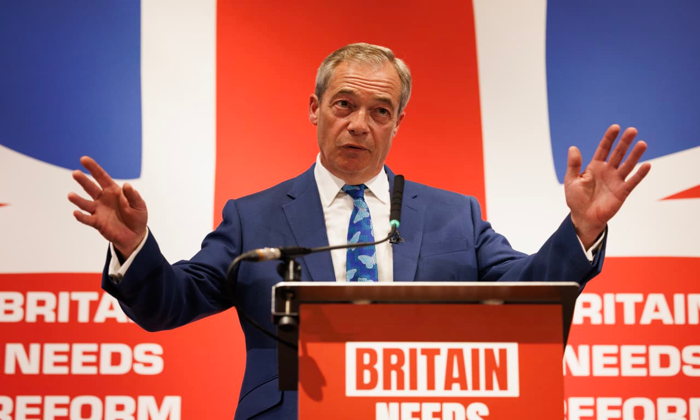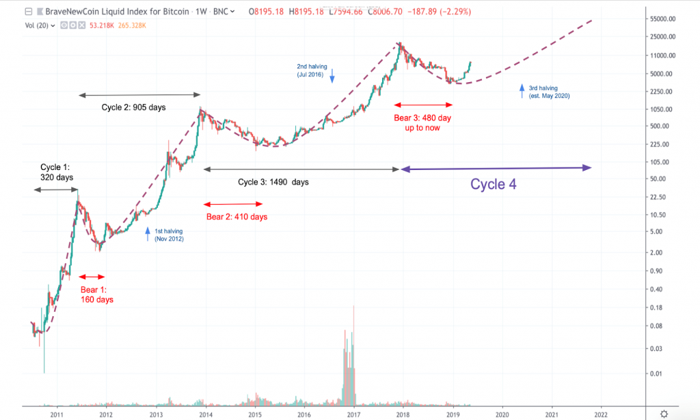In a bold move that could reshape the landscape of digital finance in the UK, Nigel Farage, leader of Reform UK, has committed to introducing pro-crypto legislation and establishing a bitcoin reserve at the Bank of England if he ascends to power. This anticipated “crypto-friendly policy” aims to secure the UK’s position in the ever-evolving cryptocurrency ecosystem, allowing individuals more freedom to engage with crypto assets without bank interference. Farage envisions a comprehensive framework, dubbed the Crypto Assets and Digital Finance Bill, which seeks to restrict banks from denying services to customers based on their crypto activities. With a proposed 10% capital gains tax on crypto, he believes that reasonable taxation will encourage transparency and legitimacy in the market. As Reform UK positions itself to accept crypto donations, it is clear that Nigel Farage crypto legislation could redefine Britain’s role in global cryptocurrency trading.
The momentum behind Nigel Farage’s vision for cryptocurrency legislation extends beyond mere political rhetoric; it reflects a broader shift towards acceptance and integration of digital currencies into mainstream finance. By advocating for a framework that facilitates the development of a crypto reserve and protects consumers from restrictive banking practices, Farage aims to propel the UK into the forefront of the crypto revolution. His initiative, expected to address key issues such as BTC legislation within the UK, underscores a commitment to fostering a conducive environment for innovation in the digital asset space. With the forthcoming Crypto Assets and Digital Finance Bill, the anticipation surrounding such legal norms signals a potential transformation in how we perceive and utilize financial technology. As public interest grows, the implications of these reforms could set pivotal precedents in global crypto regulation.
Nigel Farage’s Vision for BTC Legislation in the UK
Nigel Farage’s ambitious plan includes creating pro-crypto legislation as part of his broader economic vision for the UK. His promise to establish a Bitcoin reserve at the Bank of England signifies a shift towards adopting digital currencies at a national level, positioning the UK as a leader in the crypto landscape. By implementing the Crypto Assets and Digital Finance Bill, Farage aims to protect crypto investors and users from discriminatory banking practices, thus fostering a more inclusive financial ecosystem.
The proposed legislation seeks to eradicate the risks of banks de-banking customers who engage in cryptocurrency transactions. Farage’s focus on a reasonable 10% capital gains tax could encourage investment in digital assets, making the UK more appealing to both local and international crypto investors. This move aligns with his vision of London becoming a major global trading center for cryptocurrencies, ultimately spurring economic growth and innovation in the digital finance sector.
The Impact of Crypto-Friendly Policies in the UK
The introduction of crypto-friendly policies by Reform UK could potentially revolutionize the financial landscape of the United Kingdom. By embracing cryptocurrencies and ensuring a supportive regulatory framework, the UK could attract a plethora of digital finance firms and investors, establishing itself as a key player in the global crypto market. Such policies not only encourage the use of digital currencies but also facilitate wider adoption among the general public.
Moreover, the acceptance of crypto donations by Reform UK further solidifies the party’s commitment to integrating digital finance into mainstream politics. As political and business leaders recognize the importance of blockchain technology and cryptocurrencies, the potential for innovation in financial services expands dramatically. This shift towards embracing crypto can lay a foundation for robust economic growth, driven by technological advancements and a more engaged, digitally literate population.
Reform UK’s Commitment to Digital Finance Legislation
Reform UK’s dedication to crafting comprehensive digital finance legislation showcases a proactive approach to addressing the evolving landscape of cryptocurrencies. The party’s Crypto Assets and Digital Finance Bill is a pivotal step in establishing a regulatory framework that not only supports but also encourages the growth of the digital currency sector. By creating a policy environment conducive to crypto investments, Reform UK aims to enhance economic resilience and drive innovation in financial services.
As the UK strives to become a hub for digital finance, Reform UK’s initiatives could lead to significant revisions in current financial legislation, making room for new technologies and practices. By prohibiting banks from unfairly penalizing customers engaging with crypto, the legislation signifies a demand for greater financial inclusivity. This strategic move is critical for fostering an environment where digital finance can thrive and benefit the UK economy as a whole.
The Future of Crypto Regulation in the UK
As Nigel Farage takes a stand on crypto regulation, the implications for the future of digital finance are profound. His vision of diminishing restrictions on cryptocurrency interactions and advocating for sensible taxation could redefine how cryptocurrencies are perceived and utilized within the UK. Emphasizing the importance of clear regulations, Farage seeks to bridge the gap between traditional finance and the burgeoning crypto space, ensuring that all participants can operate without fear of undue scrutiny or punitive actions.
The future of crypto regulation in the UK hinges on the successful passage of legislation like the Crypto Assets and Digital Finance Bill. If enacted, it could promote a more balanced approach to managing digital assets, encouraging investment while safeguarding consumer interests. Farage’s promise to position London as a global trading center for cryptocurrencies reflects a strategic ambition that could resonate well with both domestic and international stakeholders in the digital finance industry.
Nigel Farage’s Campaign for a Crypto Revolution in Britain
Nigel Farage’s declaration of a crypto revolution in Britain captures a significant shift in the political attitude towards digital currencies. With an intention to position the UK as a pioneering nation for cryptocurrency adoption, Farage’s proposals underscore a commitment to innovation within the financial sector. His belief that a 10% capital gains tax will create a conducive environment for both investors and businesses demonstrates a forward-thinking approach to fiscal policy in the evolving landscape of digital finance.
The assertion that the UK can become a global leader in cryptocurrency through sound policies and legislation has the potential to rejuvenate its financial markets. By actively campaigning for pro-crypto measures, Farage aims to not only legitimize cryptocurrency but also to stimulate significant economic activity. His leadership in this space could inspire other political figures across Europe to adopt similar stances, fostering a European movement toward greater acceptance and integration of digital currencies.
The Role of Digital Finance Bills in Shaping Economic Policy
The Crypto Assets and Digital Finance Bill proposed by Nigel Farage represents a crucial element in shaping future economic policies within the UK. Such legislation would pave the way for innovative financial practices while ensuring regulatory clarity for crypto businesses and investors. By establishing a framework that prioritizes the integration of digital finance into the existing economic ecosystem, the government can enhance its competitive edge in the global market.
Additionally, these bills could address pressing concerns surrounding consumer protection, market stability, and tax fairness within the crypto space. By focusing on creating a supportive regulatory environment, the UK could attract more entrepreneurs and tech-savvy investors, ultimately bolstering economic growth. This proactive stance on technology and finance signifies a shift in perspective on how the economy can adapt to and thrive in a digital age.
Leveraging Bitcoin Reserves for Economic Stability
Establishing a Bitcoin reserve at the Bank of England, as proposed by Nigel Farage, could serve as a strategic tool for enhancing economic stability. By anchoring a portion of national resources in a decentralized digital currency, the UK could potentially mitigate risks associated with currency fluctuations and global economic uncertainties. This innovative approach to reserves would reflect a modern understanding of value and investment, positioning the UK as a forward-looking economic player.
Furthermore, adopting Bitcoin reserves could help to legitimize cryptocurrency within traditional financial institutions, fostering greater acceptance among banks and investors. Such a policy would not only provide a safeguard against inflationary pressures but also demonstrate a commitment to embracing technological advancements in the financial realm. By leveraging Bitcoin as a reserve asset, the UK could pave the way for broader acceptance and integration of digital currencies into its financial fabric.
The Importance of Capital Gains Tax in Crypto Legislation
A crucial aspect of Nigel Farage’s proposed crypto legislation includes a 10% capital gains tax on cryptocurrency assets. This tax policy could serve as a middle ground that balances the need for government revenue with the promotion of investment in digital currencies. By setting a reasonable tax rate, Farage aims to encourage more individuals and institutions to engage in cryptocurrency transactions, ultimately fostering a vibrant crypto economy.
Implementing a clear and fair capital gains tax framework can provide assurance to crypto investors, delineating their financial obligations while encouraging compliance. A structured tax policy not only enhances transparency but also incentivizes the growth and development of the cryptocurrency market in the UK. As the government embraces digital finance, establishing conducive tax regulations will be essential for maintaining competitiveness in the global arena.
Reform UK’s Push for Crypto Donations in Political Campaigns
Reform UK’s initiative to accept cryptocurrency donations marks a significant shift in political fundraising strategies. By welcoming crypto assets, the party not only acknowledges the growing popularity of digital currencies but also engages a younger, more tech-savvy demographic that is increasingly involved in financial innovation. This progressive move could set a precedent for other political parties in the UK and beyond, solidifying cryptocurrencies’ role in the future of political finance.
This approach to fundraising aligns with Reform UK’s broader vision of a crypto revolution, allowing supporters to contribute using assets they believe in. Moreover, accepting cryptocurrency donations could enhance fundraising efficiency, reduce transaction costs, and streamline the donation process. As political campaigns continue to evolve in the digital age, such initiatives could greatly impact the relationship between political entities and the electorate, making politics more accessible and responsive.
Frequently Asked Questions
What is Nigel Farage’s stance on crypto legislation in the UK?
Nigel Farage, leader of Reform UK, pledges to introduce pro-crypto legislation, including a plan to establish a bitcoin reserve at the Bank of England. He aims to prevent banks from de-banking customers engaging in crypto transactions and proposes a capital gains tax of 10% on crypto assets.
How will Nigel Farage’s crypto legislation impact UK banks?
Under Nigel Farage’s proposed crypto legislation, banks will be prohibited from de-banking customers for crypto interactions. This move aims to foster a crypto-friendly environment, making the UK a major trading center for digital assets.
What are the key features of the Crypto Assets and Digital Finance Bill proposed by Nigel Farage?
The Crypto Assets and Digital Finance Bill proposed by Nigel Farage includes establishing a bitcoin reserve at the Bank of England, prohibiting banks from de-banking crypto users, and implementing a reasonable 10% capital gains tax on crypto transactions.
What does Nigel Farage mean by a ‘crypto revolution’ in Britain?
By ‘crypto revolution,’ Nigel Farage proposes to transform the UK’s financial landscape by making London a leading crypto trading hub through supportive policies and legislation, thereby boosting the overall adoption of cryptocurrencies.
What is Reform UK’s plan regarding crypto donations?
Reform UK plans to become the first political party in Europe to accept crypto donations, aligning with its commitment to promoting a crypto-friendly policy in the UK and leveraging the growing interest in digital finance.
When are Nigel Farage’s proposed changes to crypto legislation expected to take effect?
Nigel Farage has indicated that the proposed crypto legislation will be campaigned for and implemented if Reform UK wins the upcoming general election, currently scheduled for August 2029.
What impact will Farage’s crypto-friendly policy have on digital finance in the UK?
Farage’s crypto-friendly policy is expected to enhance the UK’s digital finance landscape by encouraging innovation, investment, and secure crypto transactions, thus positioning the UK as a key player in the global crypto market.
Is there public support for Nigel Farage’s crypto legislation?
Recent polling indicates that Reform UK, under Nigel Farage’s leadership, is gaining traction and popularity, especially following solid local election performances, suggesting potential public support for his crypto legislation initiatives.
What are the potential tax implications of Nigel Farage’s BTC legislation?
Nigel Farage advocates for a 10% capital gains tax on crypto assets as part of his BTC legislation, emphasizing that reasonable tax rates can encourage compliance and growth within the crypto sector.
How does Nigel Farage view the proposed British central bank digital currency (CBDC)?
Nigel Farage has expressed opposition to the introduction of a British central bank digital currency (CBDC), favoring instead the establishment of supportive regulations for existing cryptocurrencies.
| Key Point | Details |
|---|---|
| Nigel Farage’s Commitment | Promises to introduce pro-crypto legislation and establish a BTC reserve. |
| Crypto Assets and Digital Finance Bill | Legislation aimed at supporting crypto interactions without bank penalties. |
| 10% Capital Gains Tax on Crypto | A proposed tax structure to promote reasonable tax compliance amongst crypto users. |
| Policy Direction | Reform UK aims to become the first European political party to accept crypto donations. |
| Bitcoin Conference Presence | Farage announced plans at the Bitcoin conference in Las Vegas to boost the UK’s crypto stature. |
| Election Influence | Reform UK gains traction in polls ahead of general elections set for August 2029. |
| Opposition to CBDC | Farage stands against the implementation of a British central bank digital currency. |
Summary
Nigel Farage crypto legislation aims to reshape the UK’s approach to digital currencies by introducing a pro-crypto policy framework if he assumes government leadership. His plan includes the establishment of a Bitcoin reserve at the Bank of England and the passing of the Crypto Assets and Digital Finance Bill, which seeks to prevent banks from discriminating against crypto transactions. With the growing momentum of Reform UK, Farage’s commitment may pave the way for a significant shift in the regulatory landscape, positioning the UK as a major hub for cryptocurrency trading.
Nigel Farage crypto legislation is quickly becoming a focal point in the discussion surrounding digital currencies in the UK. As the leader of Reform UK, Farage has boldly declared his intention to introduce comprehensive pro-crypto policies, including the establishment of a Bitcoin reserve at the Bank of England. This transformative approach could redefine the landscape of digital finance in Britain, providing crucial support for a crypto reserve and making the UK a global leader in cryptocurrency legislation. Furthermore, as part of his initiative, Farage aims to implement a reasonable 10% capital gains tax on crypto assets to encourage compliance and growth within the sector. With the upcoming elections in sight, these policies are gaining traction among both politicians and crypto enthusiasts alike, positioning Reform UK as a key player in the evolution of crypto-friendly policy.
The conversation around cryptocurrency is gaining momentum, especially with figures like Nigel Farage advocating for substantial reforms in the financial landscape. As he pushes for a robust framework to support Bitcoin and other digital assets, the proposed crypto reserves and progressive BTC legislation UK could revolutionize how the nation interacts with digital currencies. Farage’s vision includes safeguarding the rights of crypto investors and establishing a favorable environment for businesses operating in the digital finance arena. His commitment to leading a crypto revolution in Britain aims to enhance the country’s status as a pivotal hub for innovative financial solutions. Through the lens of the upcoming Digital Finance Bill, the potential for sweeping changes in regulatory policies could encourage more widespread adoption of cryptocurrencies.














